R2 Matrix
LV
2020-08-17
Last updated: 2020-08-18
Checks: 6 1
Knit directory: psychencode/
This reproducible R Markdown analysis was created with workflowr (version 1.6.2). The Checks tab describes the reproducibility checks that were applied when the results were created. The Past versions tab lists the development history.
The R Markdown file has unstaged changes. To know which version of the R Markdown file created these results, you’ll want to first commit it to the Git repo. If you’re still working on the analysis, you can ignore this warning. When you’re finished, you can run wflow_publish to commit the R Markdown file and build the HTML.
Great job! The global environment was empty. Objects defined in the global environment can affect the analysis in your R Markdown file in unknown ways. For reproduciblity it’s best to always run the code in an empty environment.
The command set.seed(20200622) was run prior to running the code in the R Markdown file. Setting a seed ensures that any results that rely on randomness, e.g. subsampling or permutations, are reproducible.
Great job! Recording the operating system, R version, and package versions is critical for reproducibility.
Nice! There were no cached chunks for this analysis, so you can be confident that you successfully produced the results during this run.
Great job! Using relative paths to the files within your workflowr project makes it easier to run your code on other machines.
Great! You are using Git for version control. Tracking code development and connecting the code version to the results is critical for reproducibility.
The results in this page were generated with repository version 2dee4e0. See the Past versions tab to see a history of the changes made to the R Markdown and HTML files.
Note that you need to be careful to ensure that all relevant files for the analysis have been committed to Git prior to generating the results (you can use wflow_publish or wflow_git_commit). workflowr only checks the R Markdown file, but you know if there are other scripts or data files that it depends on. Below is the status of the Git repository when the results were generated:
Ignored files:
Ignored: .Rhistory
Ignored: .Rproj.user/
Unstaged changes:
Modified: analysis/get_r2_LV.Rmd
Note that any generated files, e.g. HTML, png, CSS, etc., are not included in this status report because it is ok for generated content to have uncommitted changes.
These are the previous versions of the repository in which changes were made to the R Markdown (analysis/get_r2_LV.Rmd) and HTML (docs/get_r2_LV.html) files. If you’ve configured a remote Git repository (see ?wflow_git_remote), click on the hyperlinks in the table below to view the files as they were in that past version.
| File | Version | Author | Date | Message |
|---|---|---|---|---|
| Rmd | 72edb67 | GitHub | 2020-08-18 | Merge pull request #2 from lvairus/master |
| Rmd | f312374 | Hae Kyung Im | 2020-08-18 | fixed exists rmat |
| Rmd | 9da6862 | Laura Vairus | 2020-08-17 | fixed paths |
| Rmd | c705f35 | Laura Vairus | 2020-08-17 | debugging |
| Rmd | 633a130 | Laura Vairus | 2020-08-17 | created matrix of rsq values from PEC_TWAS_weights.tar.gz files |
Load Libraries
Run in R:
suppressPackageStartupMessages(library(RSQLite))
suppressPackageStartupMessages(library(tidyverse))
suppressPackageStartupMessages(library(data.table))cd $DATA
mkdir PEC_TWAS_weights
cd PEC_TWAS_weights
wget "http://resource.psychencode.org/Datasets/Derived/PEC_TWAS_weights.tar.gz"
tar xvf PEC_TWAS_weights.tar.gzDefinitions
PRE="/Users/lvairus"
DATA=glue::glue("{PRE}/data-Github/psychencode")
OUTPUT=DATAThis script is to copy and paste the rsq data from the PEC_TWAS_weights.tar.gz files into a matrix
filelist <- list.files(glue::glue("{DATA}/PEC_TWAS_weights/"))
filelist <- filelist[substr(filelist,1,4)=="ENSG"]
file=filelist[1]
load(glue::glue("{DATA}/PEC_TWAS_weights/{file}"))
ngenes <- length(filelist)
R2_mat <- matrix(NA, ngenes, 5)
genelist <- substr(filelist, 1, 15)
rownames(R2_mat) <- genelist
colnames(R2_mat) <- colnames(cv.performance)
for (file in filelist){
load(glue::glue("{DATA}/PEC_TWAS_weights/{file}"))
genename <- substr(file, 1, 15)
R2_mat[genename, ] <- cv.performance["rsq", ]
}
saveRDS(R2_mat, "~/data-Github/psychencode/R2_mat.RDS")if( !exists("R2_mat") ) {
R2_mat = readRDS(glue::glue("{DATA}/R2_mat.RDS"))
}
plot(R2_mat[,"enet"],R2_mat[,"top1"],main="CV R2 comparison top SNP vs enet");abline(0,1,col='gray')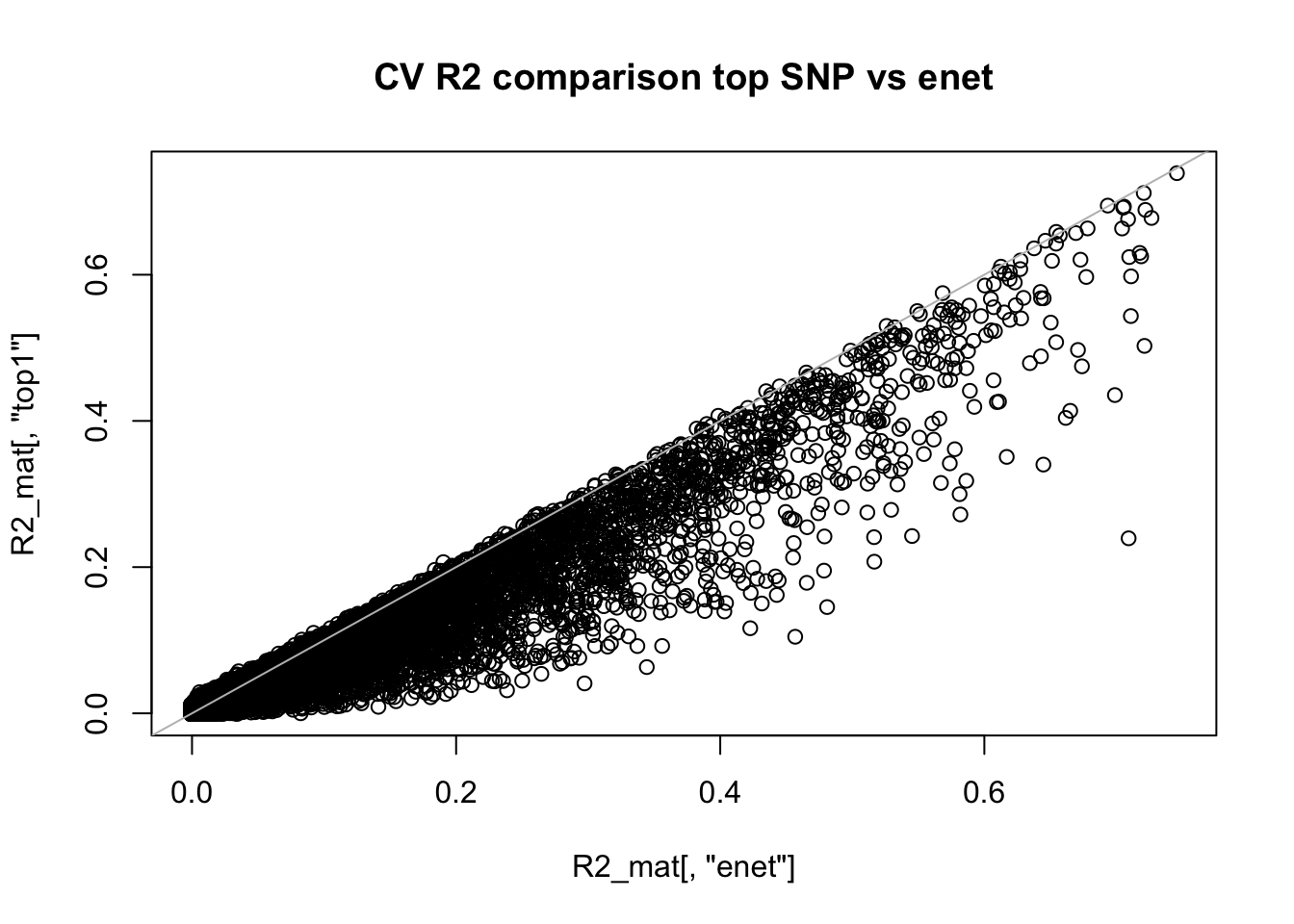
plot(R2_mat[,"enet"],R2_mat[,"blup"],main="CV R2 comparison blup vs enet");abline(0,1,col='gray')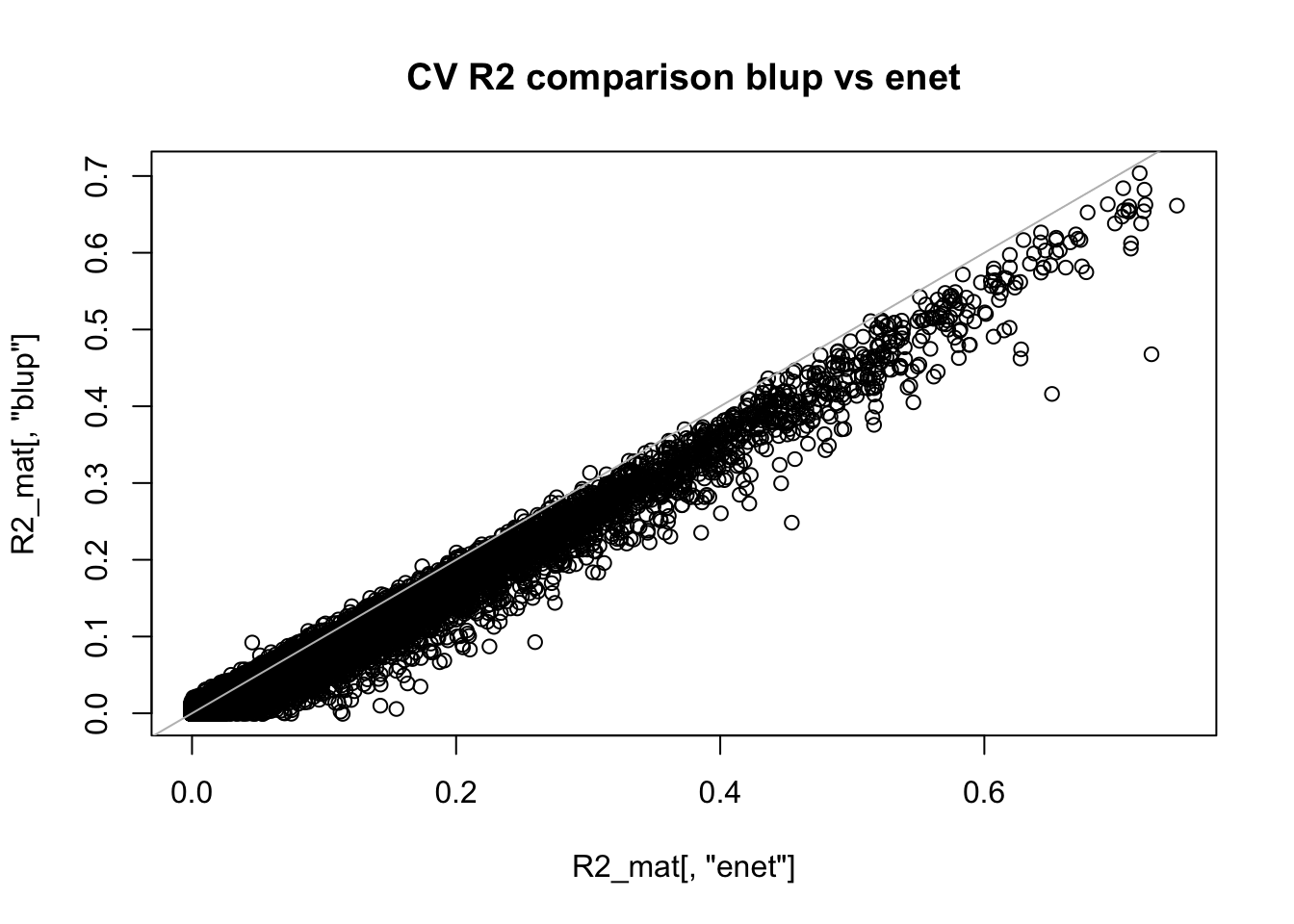
plot(R2_mat[,"enet"],R2_mat[,"bslmm"],main="CV R2 comparison bslmm vs enet");abline(0,1,col='gray')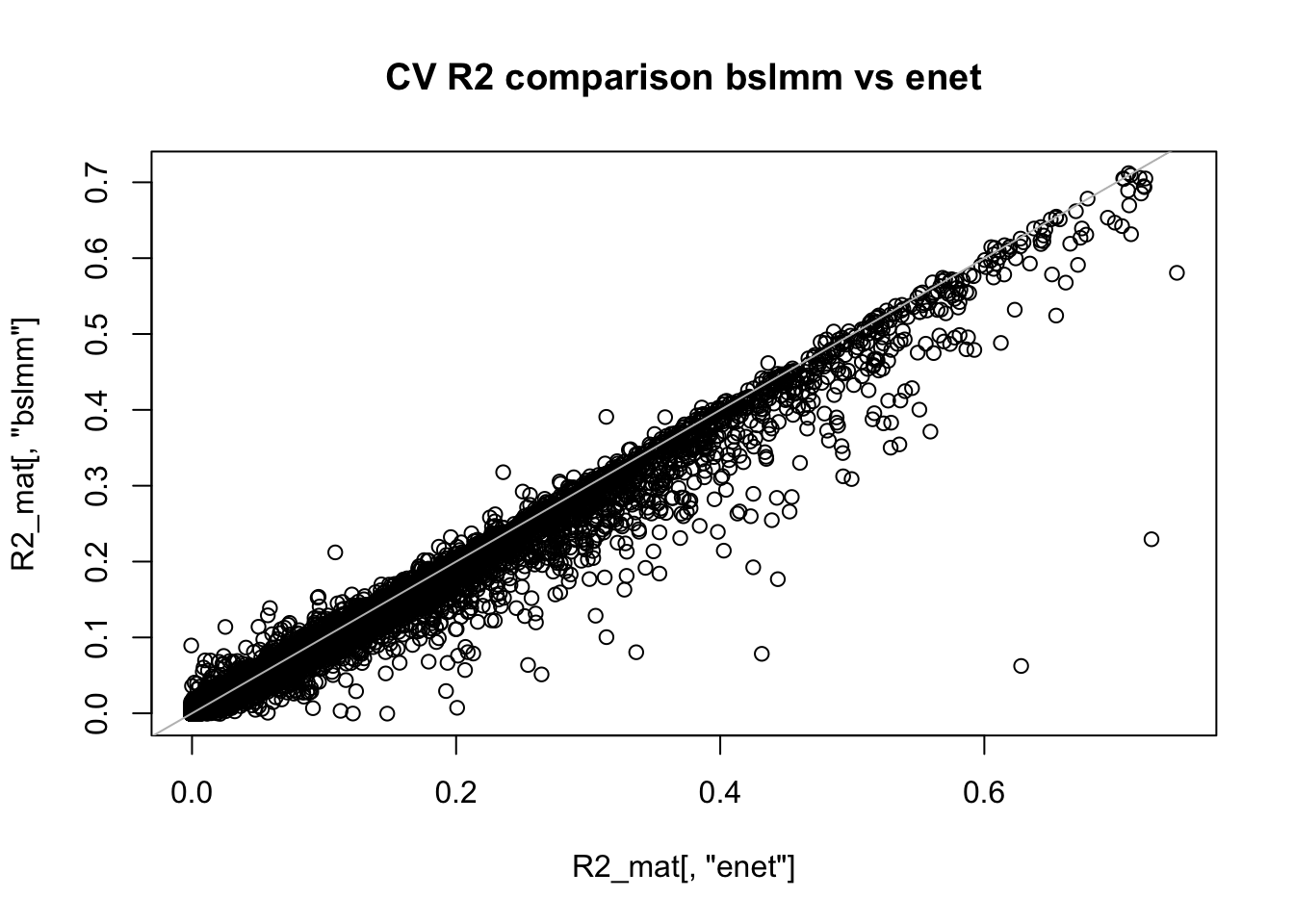
plot(R2_mat[,"enet"],R2_mat[,"lasso"],main="CV R2 comparison lasso vs enet");abline(0,1,col='gray')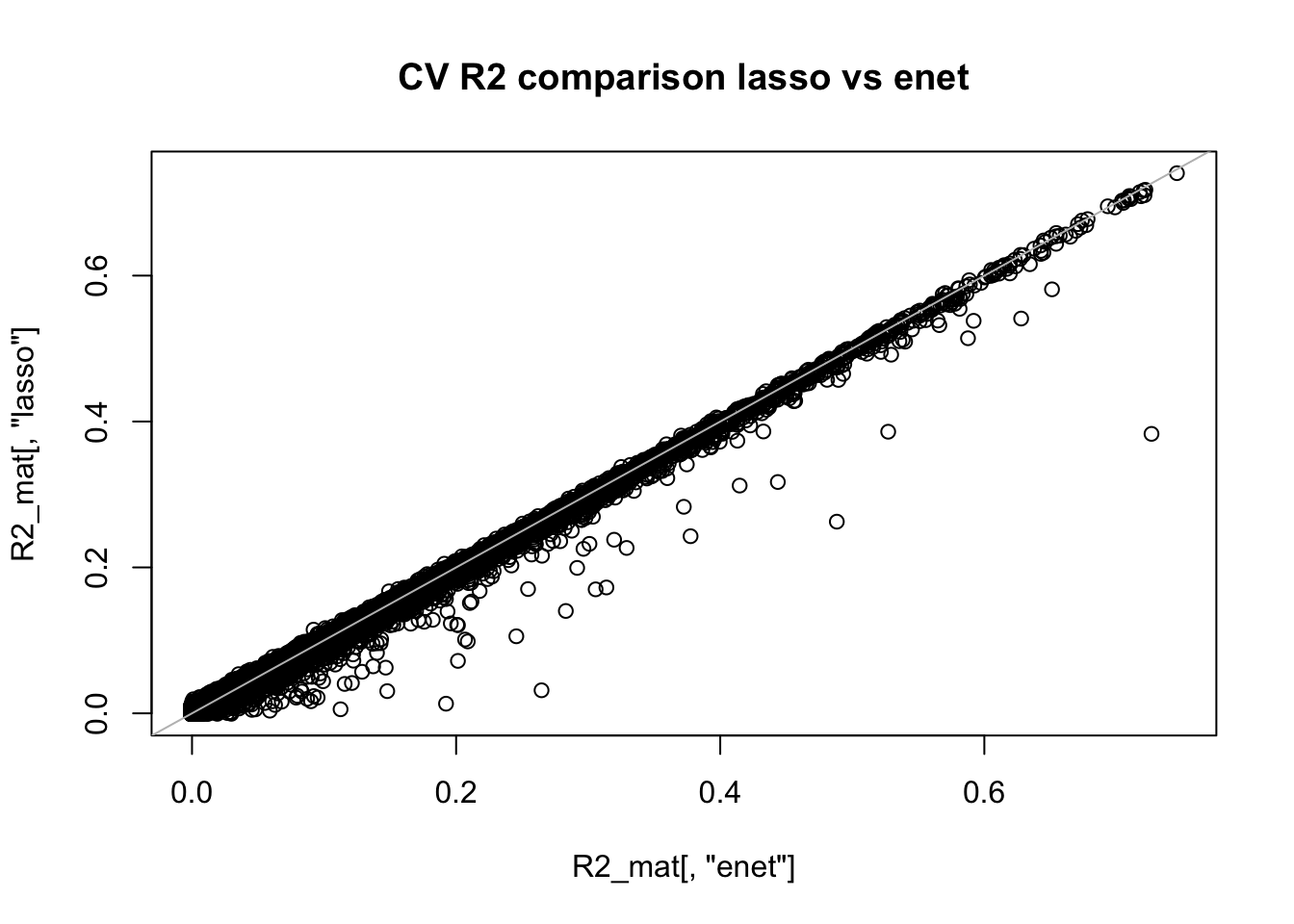
pairs(R2_mat)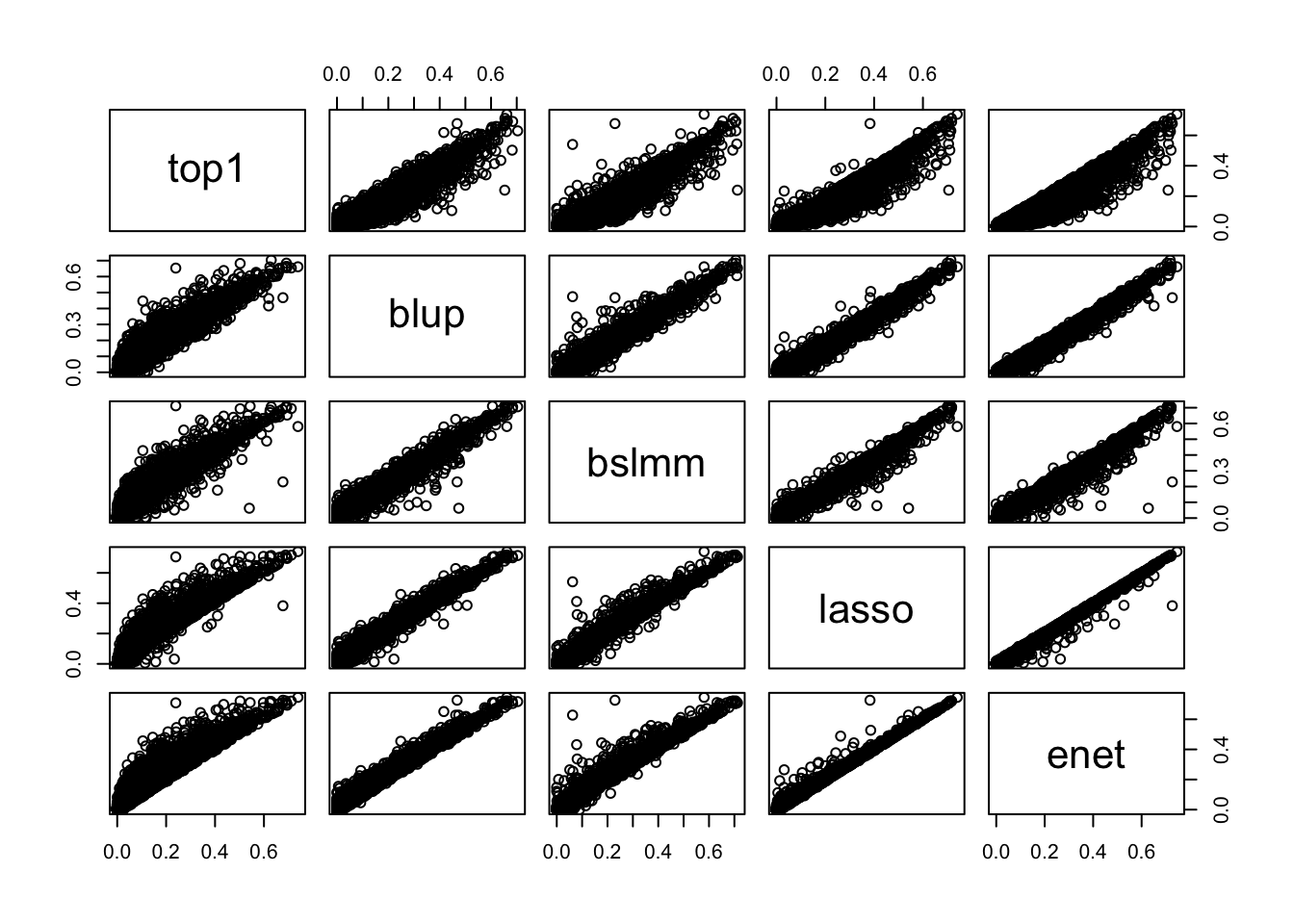
Conclusion: these figure shows that Elastic Net has overall better prediction performance (points are above the one to one line)
You can see on the graphs that, overall, the prediction performance of the Elastic Net is larger compared to the other methods.
sessionInfo()R version 3.6.3 (2020-02-29)
Platform: x86_64-apple-darwin15.6.0 (64-bit)
Running under: macOS Catalina 10.15.5
Matrix products: default
BLAS: /Library/Frameworks/R.framework/Versions/3.6/Resources/lib/libRblas.0.dylib
LAPACK: /Library/Frameworks/R.framework/Versions/3.6/Resources/lib/libRlapack.dylib
locale:
[1] en_US.UTF-8/en_US.UTF-8/en_US.UTF-8/C/en_US.UTF-8/en_US.UTF-8
attached base packages:
[1] stats graphics grDevices utils datasets methods base
other attached packages:
[1] data.table_1.12.8 forcats_0.5.0 stringr_1.4.0 dplyr_0.8.5
[5] purrr_0.3.4 readr_1.3.1 tidyr_1.0.2 tibble_3.0.0
[9] ggplot2_3.3.0 tidyverse_1.3.0 RSQLite_2.2.0
loaded via a namespace (and not attached):
[1] tidyselect_1.0.0 xfun_0.13 haven_2.2.0 lattice_0.20-41
[5] colorspace_1.4-1 vctrs_0.2.4 generics_0.0.2 htmltools_0.4.0
[9] yaml_2.2.1 blob_1.2.1 rlang_0.4.5 later_1.0.0
[13] pillar_1.4.3 withr_2.1.2 glue_1.4.1 DBI_1.1.0
[17] bit64_0.9-7 dbplyr_1.4.2 readxl_1.3.1 modelr_0.1.6
[21] lifecycle_0.2.0 cellranger_1.1.0 munsell_0.5.0 gtable_0.3.0
[25] workflowr_1.6.2 rvest_0.3.5 memoise_1.1.0 evaluate_0.14
[29] knitr_1.28 httpuv_1.5.2 fansi_0.4.1 broom_0.5.5
[33] Rcpp_1.0.4.6 promises_1.1.0 backports_1.1.6 scales_1.1.0
[37] jsonlite_1.6.1 fs_1.4.1 bit_1.1-15.2 hms_0.5.3
[41] digest_0.6.25 stringi_1.4.6 rprojroot_1.3-2 grid_3.6.3
[45] cli_2.0.2 tools_3.6.3 magrittr_1.5 crayon_1.3.4
[49] whisker_0.4 pkgconfig_2.0.3 ellipsis_0.3.0 xml2_1.3.1
[53] reprex_0.3.0 lubridate_1.7.8 rstudioapi_0.11 httr_1.4.1
[57] assertthat_0.2.1 rmarkdown_2.1 R6_2.4.1 nlme_3.1-147
[61] git2r_0.26.1 compiler_3.6.3